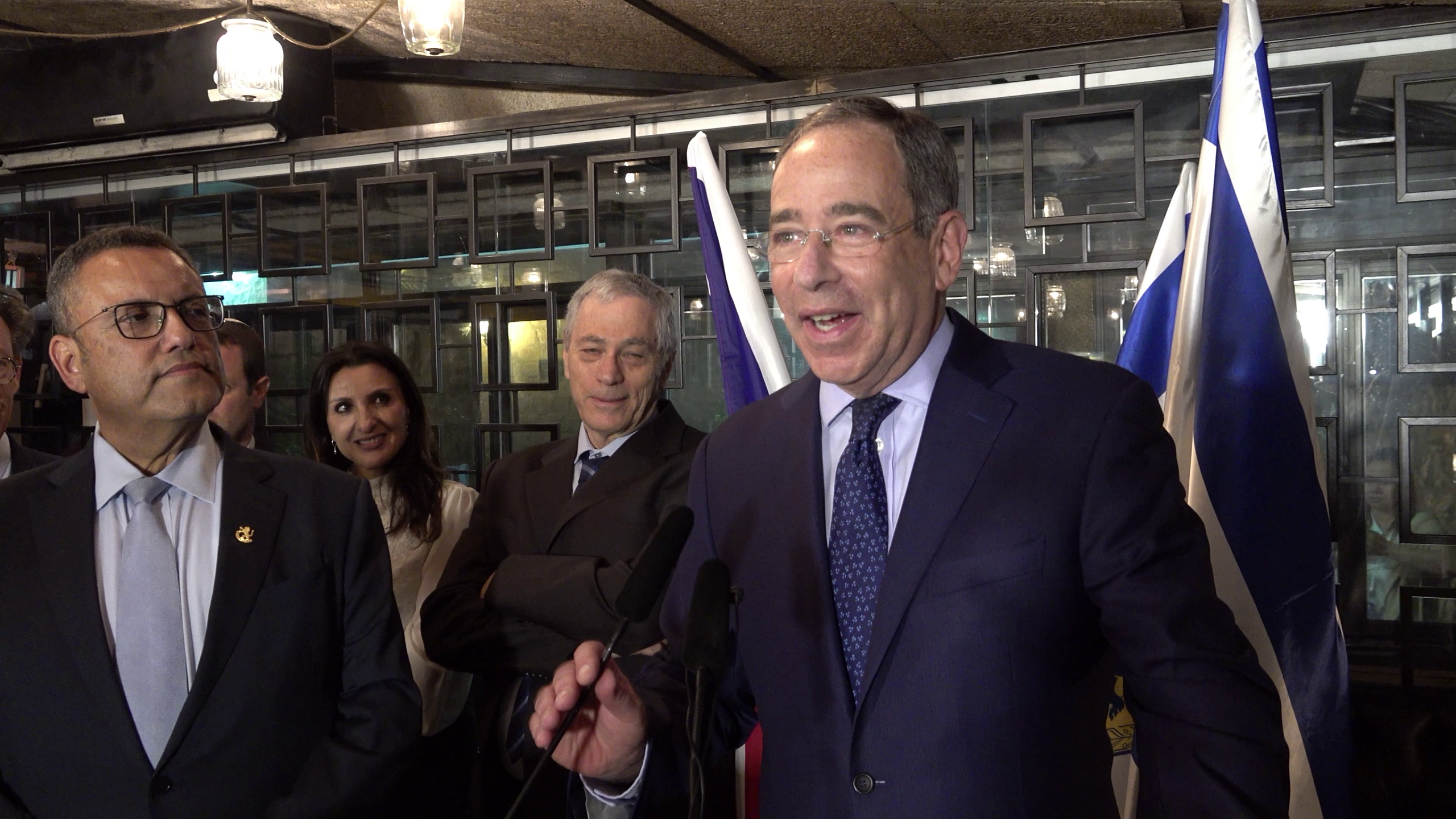Ambassador Tom Nides to TML Ahead of President Biden’s Visit: Saudi-Israeli Normalization Good for Palestinians, Too
Exuding confidence and genuine idealism, US envoy talks about upcoming presidential visit, the need for an economic and political Palestinian solution, what the US doesn't get about Israel, and strengthening the Abraham Accords
US Ambassador to Israel Tom Nides is very busy. When your boss’ boss is the president of the United States and he will be arriving for an official visit in a matter of days, there is plenty to do. In fact, Nides has been constantly on the go since arriving in Israel and assuming his position in late 2021. And he has been chronicling his meetings, speeches and new experiences on Twitter.
Nides has been asserting the “unbreakable bond” between Israel and the United States since becoming the US envoy, most recently in an address to the embassy’s official Fourth of July event at the David Citadel Hotel in Jerusalem.
He has made more than a dozen condolence visits to the homes of Israelis and Palestinians, and has made the rounds in order to ensure the passage of the visa waiver bill by Israel’s Knesset (which will now wait until the next Israeli government is elected). In fact, he is already on his second Israeli prime minister since assuming his position, and will soon be experiencing his first Israeli elections. Two weeks ago, he moved from the hotel in Jerusalem that he has been living in since he arrived in Israel to a leased villa in the tony German Colony neighborhood.
Nides was a managing director at Morgan Stanley when he was selected by President Joe Biden to be the US ambassador to Israel. Prior to his work in the private sector, he was a long-time Washington insider with stints in the US State Department and as chief of staff for Democratic congressmen.
Nides, who was born in Duluth, Minnesota and who is Jewish, is married to Virginia Carpenter Moseley, CNN’s senior vice president of newsgathering in the US.
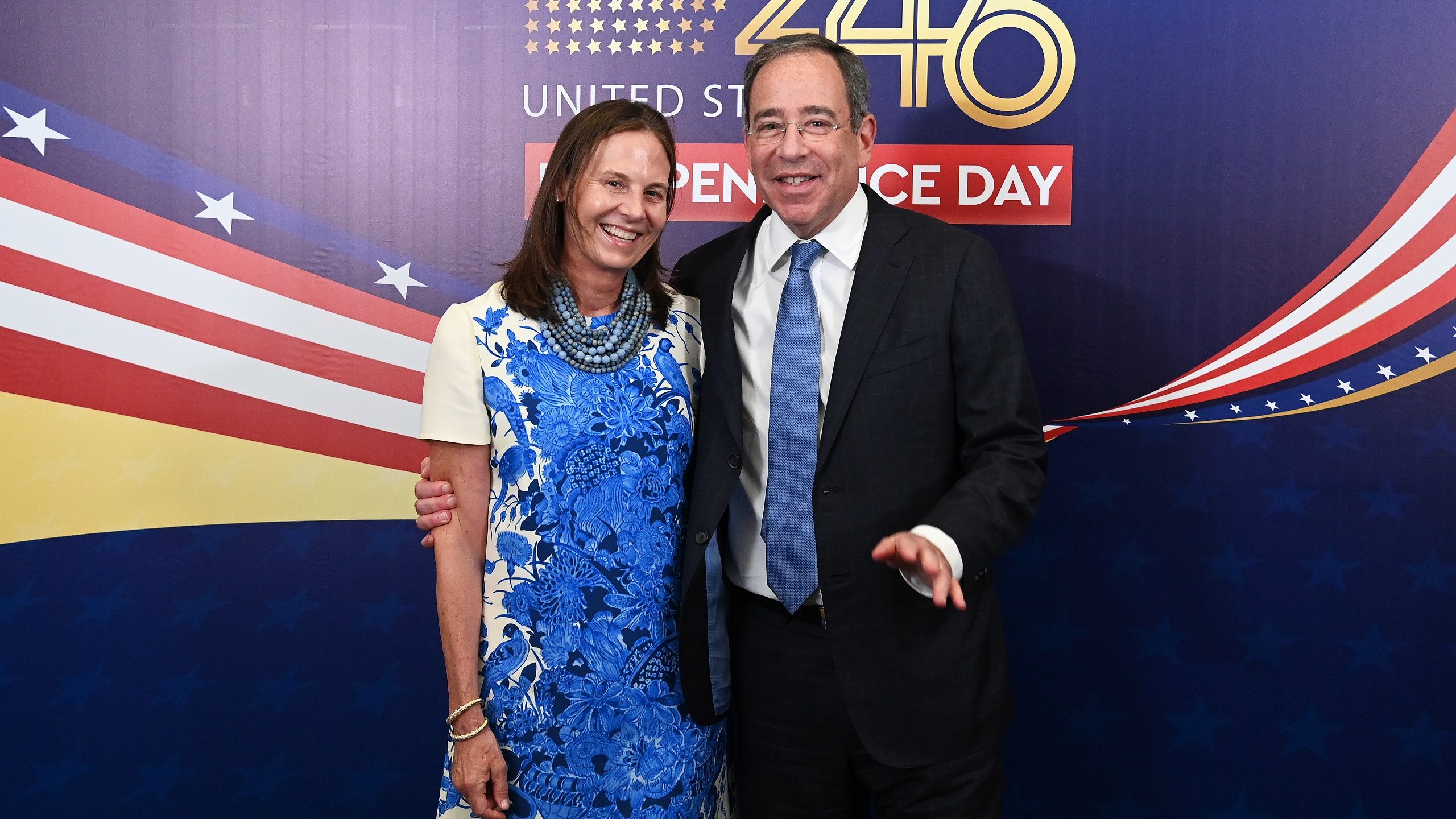
US Ambassador to Israel Thomas Nides and his wife, Virginia Carpenter Moseley, at the US Independence Day celebration at the David Citadel Hotel in Jerusalem, July 5, 2022. (David Azagury/US Embassy Jerusalem)
TML: The Middle East has again emerged as a region that holds immense promise for its people and the world but requires astute and perceptive leadership to see its benefits to fruition. Ambassador Thomas Nides is the businessman/diplomat President Joe Biden selected to serve as the United States Ambassador to the State of Israel. Mr. Ambassador, you’ve been acclimating to Israeli life, leading an exhaustive schedule as you meet with residents, diplomats, politicians and journalists, and you have even found time to find a place to live and prepare for a visit by the president of the United States. Welcome to the Middle East.
Nides: Ha ha! Thank you. Nice to be here.
TML: Mr. Ambassador, your tenure here follows the Abraham Accords breakthrough. What’s the most important outcome since the Abraham Accords were signed?
Nides: Well, first of all, the moment I got confirmed and even at my confirmation hearing, I have been an unbelievable supporter of the Abraham Accords. Yes, obviously it was done by the former administration. It doesn’t matter. They deserve credit given the fact that in my view reshaping the Middle East vis-à-vis how the neighbors think of Israel, the UAE, Morocco, Bahrain. It is to me the essence of what soft diplomacy can do when focused. So I have spent an enormous amount of time since I’ve been here trying to go deeper with the countries that have signed on and obviously getting the White House to try to go wider, which means additional countries. But listen, I think it is a spectacular achievement. I spent every month with all the ambassadors collectively. As you know, I went recently to Dubai doing what we refer to as the big soccer match of the century, the Abraham Cup. We had soccer teams from all the different countries coming to Dubai to play. It is the people-to-people piece of this which I think is really important. Yes, economics is important, clearly, but the people-to-people stuff is to me why this has been so successful, and why it will continue to be successful as more countries join and reap the benefits of the Abraham Accords. I’m all in, I’m a big believer, I enjoy it, I think it’s certainly the right thing to do and it has in fact been of enormous benefit over the long haul for the Middle East.
TML: Mr. Ambassador, you lauded the broad-based Bennett government right up to the end. Does the Lapid-led interim coalition offer more or fewer options for diplomatic achievement?
Nides: Listen, again, I try not to get involved in the politics of the country. I’d like to see that we support the Israeli people, what the Israeli people support as their government. Yes, I have been a fan of coalition politics. How cool is it to have, now alternative Prime Minister Bennett, Bennett coming in with Lapid, with Mansour Abbas, with Gideon Sa’ar, from the Left to the Right to the Center. Me, I like that, I think it’s an important part of who this place is. You can govern as a melting pot. It’s not easy, obviously, given the fact that we’re going to early elections. Yes, we’ll work with any government that this country determines who they want as their leadership. We have an unbreakable bond with Israel. Joe Biden, as you know, is coming here. Joe Biden talks about this unbreakable bond. I talk about it at every turn and we’ll obviously work with now Prime Minister Lapid as closely as we did with Prime Minister Bennett. We’ll try to stay out of politics here for the next four months, but again, the government is the government, we’ll work with the government very closely. That’s the most important thing that we can do.
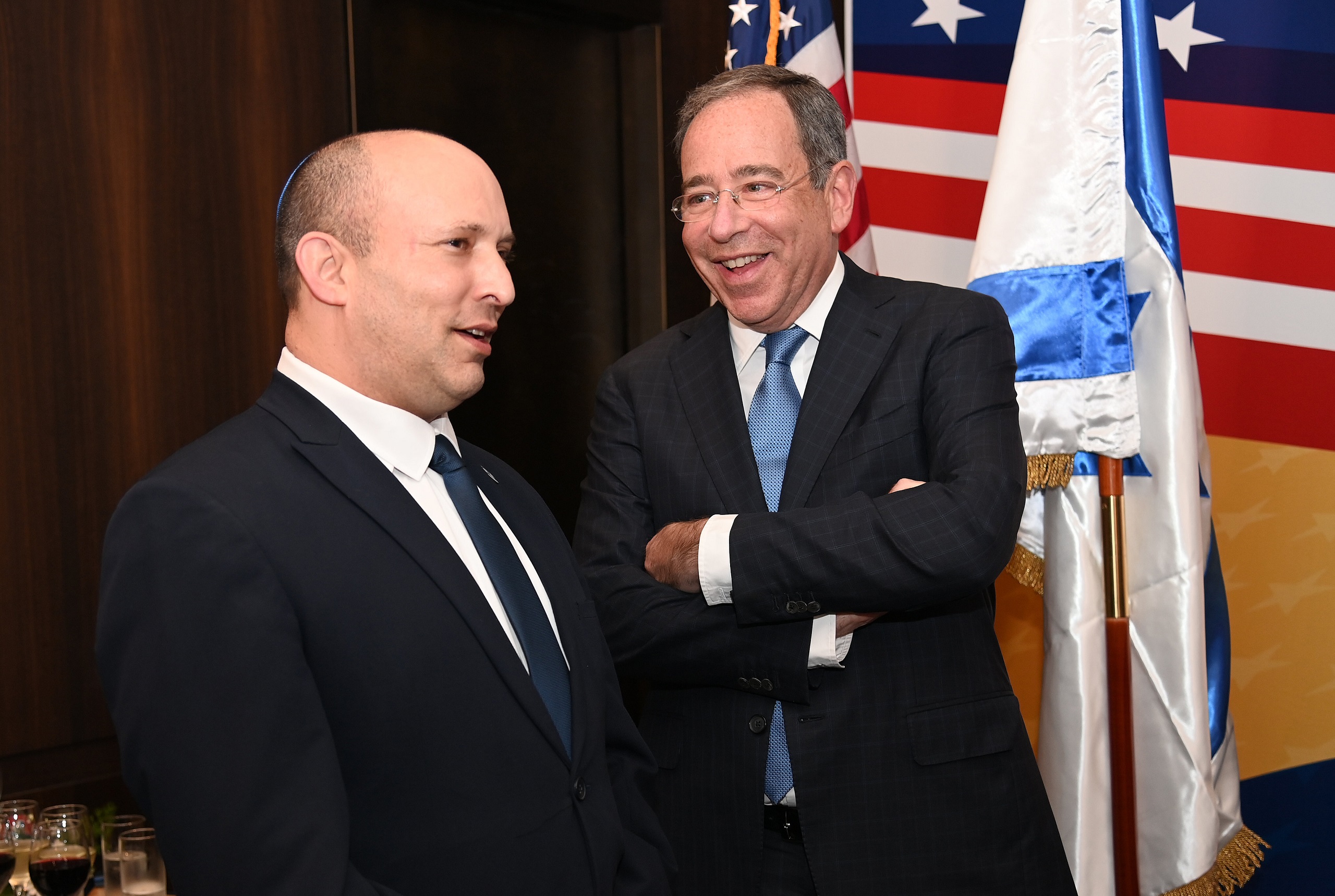
Israel’s Alternate Prime Minister Naftali Bennett with US Ambassador to Israel Thomas Nides at the US Independence Day celebration at the David Citadel Hotel in Jerusalem, July 5, 2022. (David Azagury/US Embassy Jerusalem)
TML: If a government doesn’t form and here we go again, kind of a rerun into what was prior, does that tie your hands, does it really make things more difficult?
Nides: No, listen, I have a lot of confidence in the Israeli people. They’ll figure it out. I’m very confident in the government that’s in place here. Again, this is a democracy, for good and for bad. This is a democracy and this is what the Israeli people want, not everyone wants but again, it’ll work, they’ll end up having I’m sure elections, the elections will have results. From our perspective, we’ll work with whoever is the prime minister and the government, because we are here to work with the Israeli people. To me, that’s all that really is important.
TML: Is the US administration willing to accept a response of having to wait for new elections? Two key questions: Will diplomacy continue at full gear? And I want to take that question further here, because I want to ask you, are there things that you need to accomplish through the American government that you really can’t?
Nides: As you have probably figured out, I’m not a big guy for “no.” I push and push and push. We use our relationship with the Israeli government to present things that we believe that are important to keeping this a democratic, Jewish state. Nothing will stop because of the middle of an election. Obviously, I’m sensitive that I don’t put myself involved in the election per se. But there are basic things that we want to get done that we will continue working with the Israeli government to accomplish. Regardless if there’s an election now or an election four months from now or an election a year from now, we will continue working on behalf of the American people vis-à-vis our unbreakable relations with Israel, especially around security issues, which are enormously important.
TML: Do you see any real difference in terms of ideology, in terms of what happened with Trump and Bibi Netanyahu and the current government and the Biden Administration? Is there any difference in terms of how things function?
Nides: Again, obviously every election has consequences; every government has a different point of view. Our view of this is to basically have, No. 1, to focus on this unbreakable bond between the United States and Israel, and No. 2, for us to continue to support the notion of a two-state solution, exceptionally important to keep this a democratic, Jewish state, and No. 3 is to focus on the benefits of the Abraham Accords and try to expand them, and probably most important is the security, that we have Israel’s back. Those are our messages, we are focused on those messages, and Joe Biden on his trip will focus on those messages.
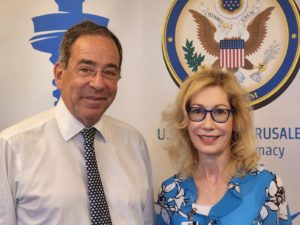
The Media Line’s Felice Friedson spoke to Ambassador Thomas Nides ahead of US President Joe Biden’s visit to Israel. (Courtesy/US Embassy Jerusalem)
TML: You are gracious in terms of giving credit to former President Trump in terms of the Abraham Accords, and many do and many don’t. The reality here is that there hasn’t been movement in terms of another country, and some say it will take a great, big move. Is Saudi Arabia on the table?
Nides: As you know, it’s been widely reported that the president will be going to Saudi Arabia next week. Again, would I love to see at some point during my tenure here that Saudi Arabia is another member of the Abraham Accords family? Of course. Of course I would. Will it happen? It’s a step-by-step process. This trip is an important part of that. Again, I’d be lying to you if I told you the United States wouldn’t like to see that happen. I think it would be good for the Saudis and I think it would be very good for the Israelis. And I think hopefully it would be good for the Palestinians, as well. So I think our view of this is, one step at a time here. I don’t want to raise expectations, but that doesn’t mean I can’t be a bit dreamy, as well.
TML: Do you see other countries that might slip in there?
Nides: Every day our team in Washington is working this, working with each country. Again this is not just about adding more countries to a list, OK. Because the reason why these have been successful after the former administration is, we are constantly working. The Negev Summit is a good example. Just think about this. Secretary Blinken came here 45 days ago, maybe two months ago. He was supposed to arrive on Thursday night, and on Tuesday Lapid called and said, “I have a great idea to do a summit for the Abraham Accords countries.” And I’m like, this is nuts. We don’t do these things this quickly. It normally takes months and months of preparation. They got within 48 hours all the foreign ministers from the UAE, from Bahrain, from Morocco, from Israel, and the secretary of state, to go to the Negev and have a summit. Unheard of. Unheard of. Again, that grew and deepened the relationship with these countries. That’s what’s important. Instead of just like, OK, let’s get this country and this country. I agree, we’d love to have more, and we’re working on it day and night. But I think the reason these have been successful is this administration, the Biden administration, is going deeper with these countries, to try to make them substantive, not just economics, this deal or that deal, but people-to-people, travel, culture. Meeting together as a team, coming up with work streams. I’m pretty excited about it.
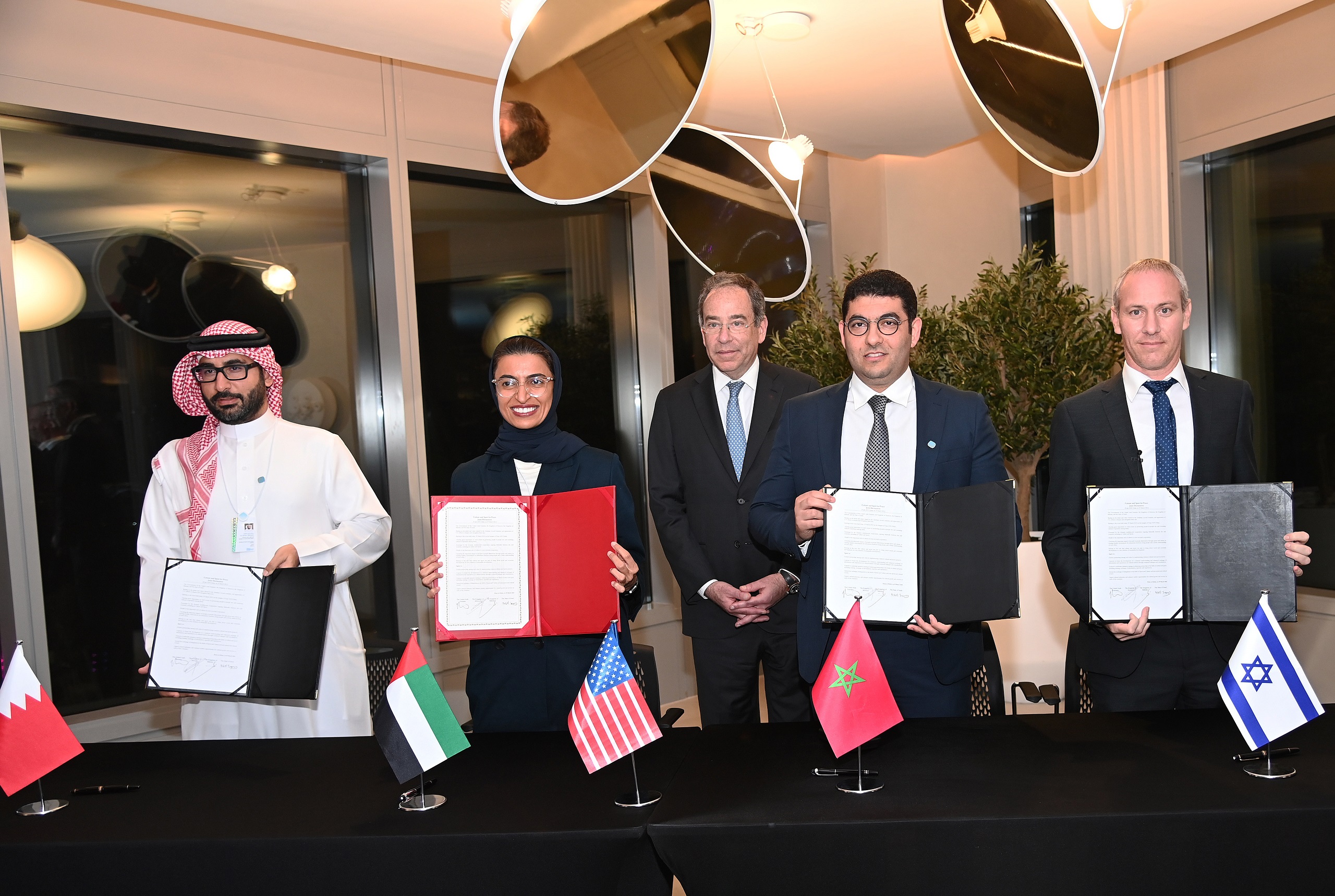
Ambassador Thomas Nides meets with representatives of Bahrain, the UAE, Morocco, and Israel on a trip to the UAE in support of the Abraham Accords, March 29, 2022. (US Embassy Jerusalem)
TML: The Iranian nuclear deal, the JCPOA, has lived down to the most pessimistic estimations. It appears that the JCPOA version 2 is dead in the water. Is this so, or did it come too late?
Nides: Well, first of all, as you know, the administration has been very clear that we’d like to have a diplomatic solution to this situation. The president has also made it clear he has very clear demands for that to happen, including his decision not to forgo the FTO, the Foreign Terrorist Organization designation. We are still working to try to determine if there is room to get to a diplomatic solution. No. 2, we have said from the get-go we have no intention of tying the Israelis’ hands for what they believe they need to do for their national security interests. And No. 3, we have Israel’s back, and I think that’s very important for people to understand. Where this goes over the next month or two months, I don’t really know, but again, obviously, our government’s position has always been we’d like a diplomatic solution, but as we’ve also said, all options are on the table.
TML: Would you agree that Iran is arguably days away from nuclear weapon capability?
Nides: I’m not going to give you a clear answer to is it weeks, is it months, is it hours. Let’s just put it this way: They are close, they’re close. That is why we have attempted over a period of time to come up with a diplomatic solution as well as work with the Israelis on the intelligence sharing. Again, not in any way trying to tie the Israelis’ hands in the actions they believe they need to take for their own national security. Again, I can’t speculate exactly what the timing is but obviously we’re concerned.
TML: Israeli Defense Minister Gantz recently spoke of a formal Middle East defense organization. Can you comment on this?
Nides: Again, I’ll let Sec. Def. Austin talk about that as well as Defense Minister Gantz as well as his own leaders. But listen, there has always been and will continue to be great cooperation among Middle East partners vis-à-vis, as they say, the enemy of your enemy is your friend. Obviously, we’ll be focusing collectively on what the threats are in the region, including Iran and their proxies.
TML: The lack of a definitive answer in the case of the death of journalist Shireen Abu Akleh is a grave disappointment to many Palestinians and indeed a source of distress for them with the US. You worked hard to convince the Palestinians to hand over the bullet. The Palestinians demand a finding of intent. How will this chapter end?
Nides: Well first of all I went to the wake of Shireen, I sat with her brother and her niece and held their hands. My heart breaks for them. I didn’t know her, but the people who knew her found her like an iconic figure in the world of journalism and representing decency, and so my heart breaks. I’ve had half a dozen conversations with Shireen’s brother. We worked day in and day out to try to come to some sort of understanding of what happened. We worked aggressively to not only look at the evidence that we got but also to get the bullet, and I think you obviously read around the ballistics report and also the State Department determined that we believed that it was likely she was killed by an IDF soldier. Not intentionally, obviously, in our view, and again I think an investigation will continue by the IDF and the Palestinians. All I can say is it’s just a tragic situation. Here’s a phenomenal journalist who reported the news, was in a place in Jenin which was dangerous by any aspect. It’s just terrible. My spouse is in journalism, you’re in journalism, war correspondents put their life on the line so the viewers can see what’s going on. It’s exceptionally dangerous. My heart just breaks from that.
TML: Ambassador Nides, you’ve described yourself in interviews as a Zionist. You even said this to the president. What do you say to those who argue that you cannot do your job effectively if you embrace Zionism?
Nides: That seems to be a personal issue for people. I’m a Zionist, I’m a Reform Jew from Duluth. I grew up as a Reform Jew. I care deeply about keeping this country a democratic, Jewish state. And I fundamentally believe that the only way you’re going to do this is to keep the vision of a two-state vision alive. Which means we must wake up every day and help the Palestinian people, to make sure that they don’t lose sight of that. You can be pro-Palestinian and pro-Israel. It doesn’t take away from your commitment to the Jewish people or the homeland of the Jewish people by saying you want to help the Palestinian people. I’ll just let that stay there.
TML: The wish list of five gestures sought by the Palestinians during the president’s visit was sent to the White House with the expectation that at least one might be fulfilled. I’m not going to run through the list, you know. The question is that if nothing emerges, the Palestinians could revert to a freeze such as they did against the Trump Administration. Is this a possible scenario?
Nides: I wake up every day to express to the Israeli people this unbreakable bond. I don’t think anyone question’s Joe Biden, who also calls himself a Zionist, by the way, and our commitment to the security of the State of Israel. We also fundamentally believe that if Israel is going to be a democratic, Jewish state over the long haul, a two-state solution is really important. This is an administration that went from zero funding to the Palestinian people, from the previous administration, to basically giving almost $700 million, for health care, for education, for issues around refugees. We’re putting our money where our mouth is. I talk about a two-state solution every day. I’m supposed to be the ambassador to Israel, but I spend time on the Palestinian people because I believe it makes Israel stronger. This is not a question of list, no list, they know what’s in our heart. What the Palestinians do or don’t do vis-à-vis what we can do or not do, they know this ambassador, this president, cares deeply about the Palestinian people, because we believe ultimately if the Palestinian people feel good about the situation or the direction it will also strengthen Israel as well, for their own security, keeping Israel as a democratic, Jewish state, helping Israel on the international stage. I’m a big believer in actions.
TML: Many leaders that I have interviewed in the Palestinian Authority as well as people on the street keep stressing at the moment that we can’t just go with the economic side, we need a political answer. What do you say to that?
Nides: We don’t disagree. That’s why I talk about at every single meeting the importance of having a vision and a two–state solution. I’m under no illusions here that I’ll be getting the Nobel Peace Prize or sharing it with anyone in the Rose Garden anytime soon, but that does not mean we cannot keep helping the Palestinian people, doing things that make their lives better. The kids and the adults on the streets, we need to help them. And I think that’s really important, and that’s why we spend a lot of energy trying to do those things.
TML: The Palestinians are again expressing their feelings that the US cannot be an honest broker because of its relationship with Israel. We asked the same question of the previous administration, so allow me to ask you: Can the US be impartial?
Nides: Absolutely. I mean, listen, again, you can be pro-Israeli, you can call yourself a Zionist, and still support the Palestinian people. You can do both, and you must do both. I don’t think there’s a difference between the two. Yes, if you look around the region and the world, the US has been, at least this administration, has been a steadfast supporter of the Palestinian people, to try to help them as best we can. Yes, the answer is, we are without question a supporter of a strong, democratic Jewish state, a strong supporter of Israel. We can also stand up as we do every day and support the Palestinian people. Listen, we’ve been working with the Congress to get money, the MEPPA programs, all these programs that exist working with the Congress. Again, I think you can do both, and we do both. And yes, you can be an honest broker.
TML: Growing up where you did in the United States, and hearing Democrats and Republicans on how they are miles apart today, unfortunately, do you feel there’s any common place when it comes to Israel that, especially the Jews, can come together to understand the United States is trying to act as this honest broker?
Nides: I mean, again, I think it, listen, as you know, a vast majority of American Jews believe as I do about the importance of supporting the security for the State of Israel, and, I believe, most Jews in the United States, I obviously I can’t speak for most Jews, believe in the importance of the two-state solution. That is a commonality, that is something they want their politicians to stand for and talk about, because ultimately, I think that if you’re an American Jew you look around and say, “Wow, we love Israel.” For Israel to stay a democratic, Jewish state, they understand the long-term need to have a relationship with your neighbor. It’s not just a neighbor; it’s 15 minutes away from Jerusalem. One of the lessons I’ve learned here is how close everyone is, how important not only the Palestinians are, what they do, but those Palestinians, those Arabs, who live in Israel. Twenty percent of the population in this country, we should not forget about who are here and need to be supported and focused on. I have said this before. I’ve traveled all over the country, north, south, east. I’ll meet with anyone. I meet with haredim, I meet with the Bedouin community, I meet with the Druze families. I’ve been to, sadly, every home that has been touched in Israel by the most recent wave of terrorist attacks. I held the hands of a Druze family in Nazareth and I went down to Beersheba. I’ve done it and I sense this is what this country’s about, it’s a melting pot. It’s not just Jews, it’s not just Arabs, but it’s across all different religions and all sorts of different communities. That’s why Israel is Israel. And I think that’s what’s important.
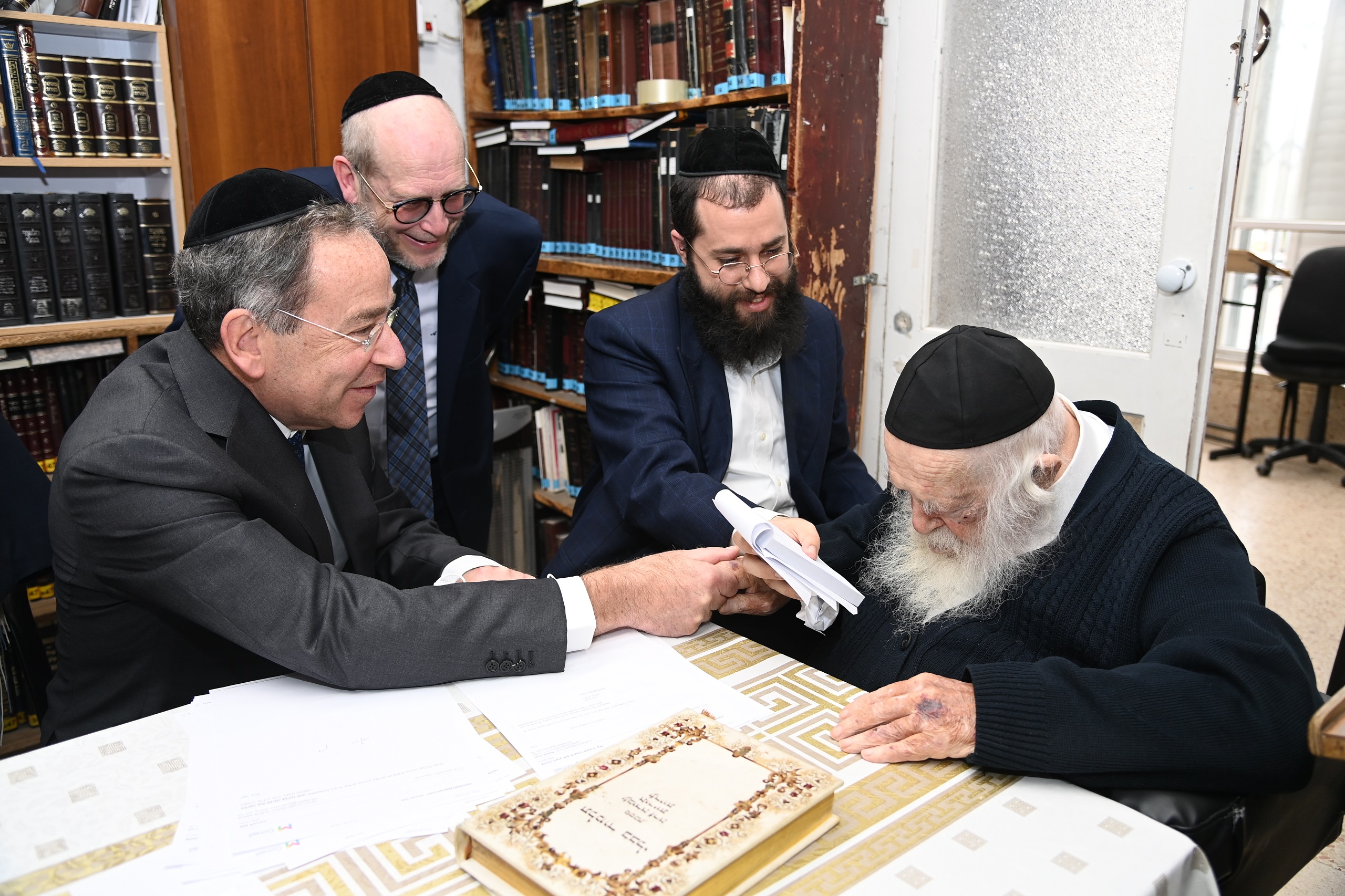
Ambassador Thomas Nides meets with the late Rabbi Chaim Kanievsky in Bnei Brak, Dec. 16, 2021. (US Embassy Jerusalem)
TML: So what’s misunderstood, what’s taken out of context that Americans don’t understand about Israel and its neighbors?
Nides: Well, I think No. 1, I don’t think they recognize what a melting pot this country is, both in Israel and obviously the West Bank and Gaza. I think they probably don’t understand how intertwined all these relationships are, how intertwined. And I think that’s really important. No. 2, most Americans probably don’t understand the threats in this region. They know it intellectually. But listen, just go to the Golan and look at what’s going on in Syria. Just look at a map and look at Lebanon. Go look at Hamas in Gaza. Israel is under an enormous security anxiety. Again, it would be like you live in the District of Columbia, you live in DC, and some of the people who lived in Maryland, and some of the people who lived in Virginia didn’t want you to exist. Not a great feeling, OK. And that’s basically in many cases what Israel works on every day. There are legitimate security issues, and not including what’s going on in Iran. There are legitimate security issues. But the flip of that is, I think it’s important for people to understand why it is important to basically get along with your neighbors. Why it’s important for us to keep pushing a two-state solution, why we support for the psychiatry of the Palestinian people. And one thing we saw in May of last year were Arabs and Jews who live in Israel − there was some fighting among themselves. That happened for a long time. I go to Jaffa. I love going to Jaffa. It’s a mixed community. God forbid that the Arabs who live in Jaffa, the Jews who live in Jaffa, start fighting with each other. That’s terrifying. I think it’s important for people to understand how small this place is, not just intellectually, how the neighborhood looks to the Israelis as well the importance of the Palestinians and how they see their vision, how they see their future.
TML: Can you share anything about the upcoming visit by President Biden?
Nides: I mean, listen, just to be clear, this is the president’s 10th visit to Israel. I would bet you if you took the number of visits of all the presidents in the White House, you couldn’t get to 10 visits, OK. As I said before, he probably calls himself a Zionist. He has been here since Golda Meir was prime minister. I’m sure you’ll hear the Golda stories when he’s here. He understands this place. Not only was he chairman of the [Senate] Judiciary Committee, chairman of the Foreign Relations Committee, the vice president of the United States, now the president, he understands in his gut how the Middle East is formed, how people think, and he’s been exceptionally close to the Jewish community but understands the importance of all the populations of the region. Listen, I thought he was going to present an unbreakable bond, make sure people understand his unbreakable commitment to Israel. He’s obviously going to the West Bank and meet with Abbas. He will also share with Abbas again the importance of keeping the vision of a two-state solution alive, exceptionally important. And then he’ll obviously be off to go to Saudi. So I think the Israeli people in particular will see a guy who’s very comfortable being here, very comfortable meeting with the leaders here in Israel, and obviously the leaders in the West Bank. So people will get a sense of who this guy is and what his commitment is.
TML: How complicated is it in terms of the Saudi visit because of the Khashoggi issue, the human rights issues that President Biden has before in terms of moving forward with Saudi Arabia?
Nides: I don’t think anyone can question Joe Biden’s commitment to human rights. Obviously, he’s been very focused on those matters that created some anxiety among the American people. He felt very strongly about it. He hasn’t shied away from expressing those anxieties, but it’s now our national security interests as well and he plans to go to Saudi. It’s not just about Saudi, it’s about the GCC. As you know, Saudi Arabia is chair of the GCC this year, so he’s meeting all the leaders of the GCC at the same time, which is very, very important.
TML: Growing up, did you ever think you’d end up here?
Nides: No way, OK? Listen, I was a Jewish little kid who came at 14 years old. I went on a kibbutz called Ein Hashofet up north. It was actually named after, it’s called “Justice,” after Justice Brandeis. When I was picking vegetables at 4 o’clock in the morning, did I ever think that some 50 years later I’d be here as the American ambassador? No. But it is an enormous honor. Without getting goofy here, I’m a lucky guy. I care deeply about this place, but to be able to stand up and say you’re the ambassador to the State of Israel, how cool is that?
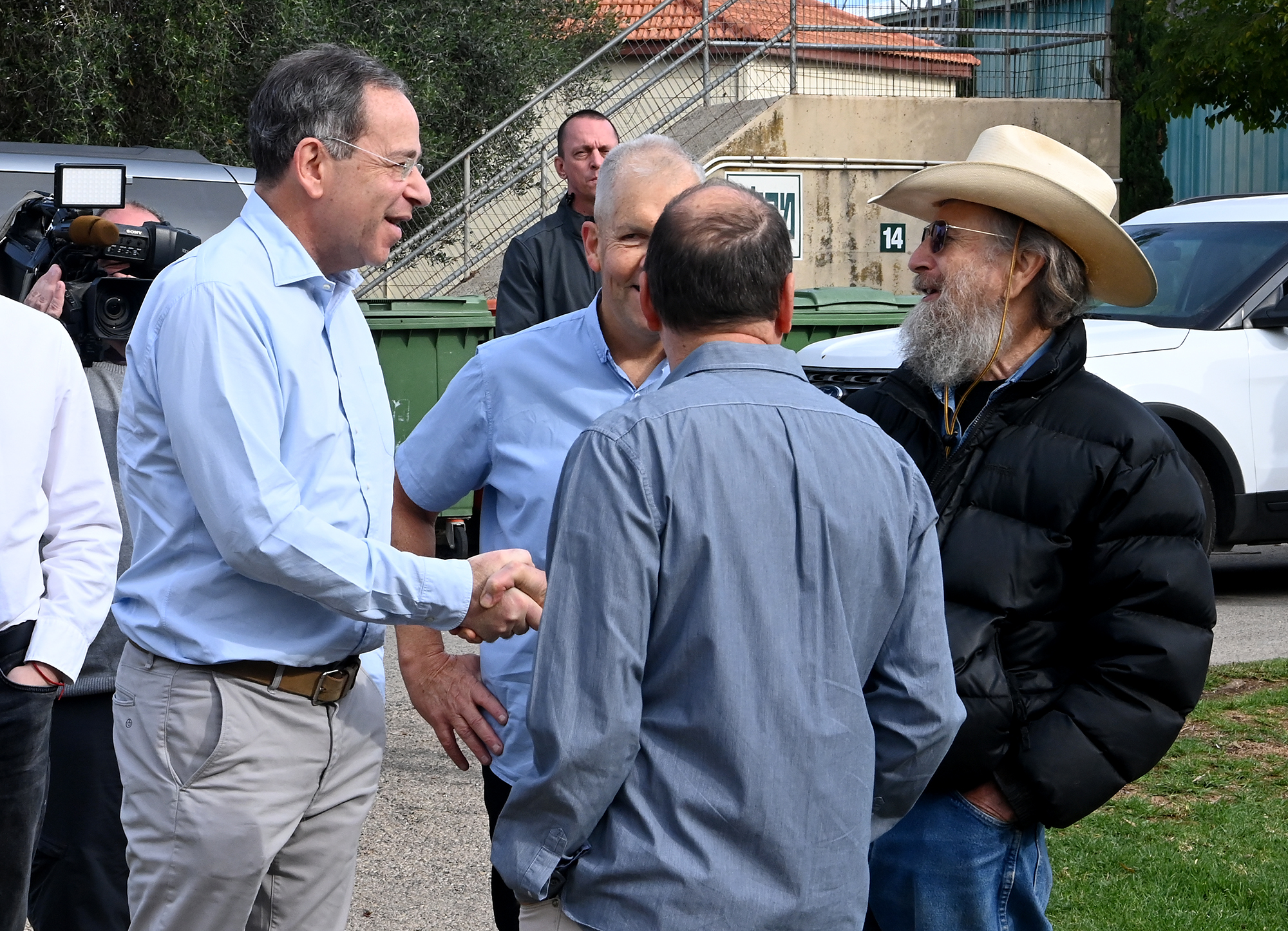
Ambassador Thomas Nides visits Kibbutz Ein Hashofet, Dec. 3, 2021. (Matty Stern/US Embassy Jerusalem)
TML: Did you sleep better before you took this position?
Nides: This place is not easy, just to be clear. I was commenting to my wife, I joke but I work eight days a week. I get literally no break because everyone cares about this place. I’ve had almost 80 members of Congress visit me since I’ve been here, and because I’m not ideological, I’ll meet with anyone, I’ll meet with anyone. I don’t care if people call me. I’ve stopped using those words, the two words you don’t want to use when you’re an ambassador to Israel: Come visit. I’ve taken those out of my vocabulary. Again, I don’t shy away from telling people what they don’t want to hear, because I have very strong views, but I’m not ideological. It would be easier if I was because then I wouldn’t have to deal with half the people I deal with, you don’t fall into my category, but it’s an enormous honor, it’s an enormous honor. I could not be prouder that President Biden chose me to do this, but it’s not for the faint of heart.
TML: Well, on that note, I want to thank you very much, Ambassador, for your time.
Nides: Sure, it’s great. Thank you for having me. It’s fun.

